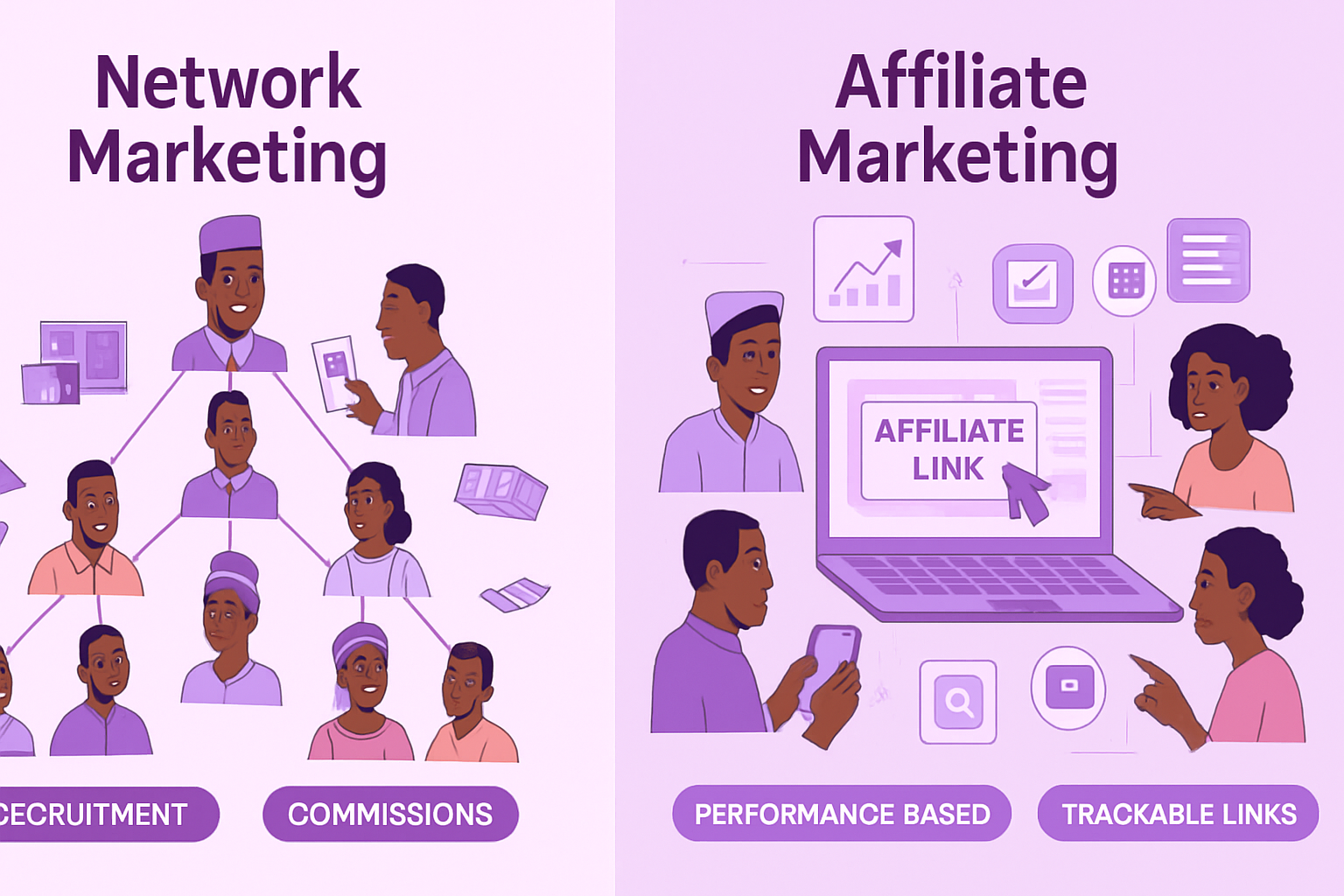Network Marketing vs. Affiliate Marketing: What’s the Difference & Which is Right for Your Business?

Network Marketing vs. Affiliate Marketing: What’s the Difference & Which is Right for Your Business?
Growth is the lifeblood of any business, especially for startups and SMEs in the digital space. You’re constantly looking for cost-effective ways to acquire new customers and scale revenue. Two popular strategies often mentioned are Network Marketing (NM) and Affiliate Marketing (AM). While both leverage relationships to drive sales, they operate very differently.
Understanding the distinction is crucial for choosing the right growth engine for your business. Let’s break down Network Marketing vs. Affiliate Marketing to see how they compare and why one might be a significantly better fit for your digital-first company.
What is Network Marketing (NM)?
Network Marketing, often called Multi-Level Marketing (MLM), is a business model where independent representatives sell products or services directly to consumers. The core feature is its hierarchical, multi-level structure.
- Focus: Participants earn income not only from their own sales but also by recruiting new distributors into their “downline.” They then earn a percentage of the sales generated by those they’ve recruited, and potentially the sales of recruits further down the line.
- Structure: Creates a pyramid-like commission structure (though legitimate MLMs differ from illegal pyramid schemes by focusing on actual product sales).
- Common Traits: Often involves starter kits, minimum purchase requirements, and a heavy emphasis on recruitment alongside product sales. Examples are common in health/wellness, cosmetics, and household goods industries.
What is Affiliate Marketing (AM)?
Affiliate Marketing is a performance-based marketing strategy where a business rewards external partners (affiliates) for each customer or sale brought in through the affiliate’s own marketing efforts.
- Focus: Affiliates promote a company’s products or services using unique trackable links. They earn a commission only when their promotional activities lead to a desired action (like a sale, lead, or sign-up). There’s typically no recruitment element involved for the affiliate’s earnings.
- Structure: A straightforward partnership between the business (merchant) and the promoter (affiliate). It’s a single-level relationship focused purely on performance.
- Common Traits: Relies heavily on digital channels (blogs, social media, email lists, paid ads), unique tracking links, and performance dashboards. It’s ideal for e-commerce, SaaS, digital services, and virtually any online business.
Key Differences: Network Marketing vs. Affiliate Marketing
| Feature | Network Marketing (MLM) | Affiliate Marketing |
|---|---|---|
| Primary Focus | Recruitment + Personal Sales | Promoting Products/Services for Commission |
| Income Source | Personal Sales + Downline Commissions | Commissions on Own Referrals/Sales |
| Structure | Multi-Level Hierarchy | Single-Level Partnership (Merchant <> Affiliate) |
| Entry Barrier | Often requires buying starter kits/inventory | Usually free to join programs |
| Tools | Direct Selling, Events, Personal Networks | Unique Tracking Links, Digital Content, Ads |
| Complexity | High (managing downlines, complex payouts) | Lower (focus on tracking & direct payouts) |
| Best Fit For | Direct Sales Models, Physical Products | Digital Products, E-commerce, SaaS, Online Services |
Why Affiliate Marketing is Often the Go-To for Digital Businesses
For startups and growing companies in SaaS, e-commerce, real estate tech, fintech, and other digital sectors, Affiliate Marketing typically offers significant advantages:
- Simplicity & Scalability: Setting up and managing an affiliate program is far less complex than building and maintaining an MLM structure. Platforms like m30.io allow you to launch a robust affiliate program in minutes, handling tracking, management, and payouts seamlessly.
- Lower Risk & Cost: You only pay affiliates for actual results (sales or qualified leads). There are no upfront inventory costs or complex multi-level commission calculations to manage. It’s a purely performance-based investment.
- Clear Performance Tracking: Digital tools provide precise tracking of clicks, conversions, and commissions through unique affiliate links (like the
m30.ng/<code>short URLs provided by m30). This makes ROI calculation straightforward. - Focus on Product/Service Value: Affiliates succeed by genuinely promoting valuable products or services to their audience. The focus stays on the quality of your offering, not on recruitment quotas.
- Leverages Existing Audiences: You can tap into the established audiences of bloggers, influencers, content creators, and complementary businesses without needing them to become direct salespeople or recruiters.
- Flexibility: You can easily customize commission structures (e.g., for sign-ups vs. purchases) and integrate affiliate marketing alongside other strategies, like customer referral programs. m30 even supports flexible reward systems, including points-based incentives.
Integrating Referral Marketing: The Best of Both Worlds?
It’s worth noting that Referral Marketing, where you reward existing customers for bringing in new ones, shares some DNA with both models but is closer to Affiliate Marketing in its simplicity. Platforms like m30.io offer dedicated referral marketing toolkits alongside affiliate features, allowing you to empower your loyal customers to become advocates using unique codes and automated rewards.
Conclusion: Choose the Right Engine for Your Growth
While both Network Marketing and Affiliate Marketing aim to leverage relationships for growth, Affiliate Marketing offers a more direct, scalable, and trackable solution for most digital-first businesses. Its performance-based nature minimizes risk, and modern platforms make it incredibly easy to manage.
If you’re a startup or SME in SaaS, e-commerce, real estate, or another online sector looking for a powerful, low-friction way to drive customer acquisition, Affiliate Marketing is likely the superior choice.
Ready to harness the power of partnerships for your business?
Explore m30.io to see how our all-in-one platform can help you launch, manage, and scale your affiliate and referral programs effortlessly. Get started today and turn your happy customers and partners into your best growth channel!